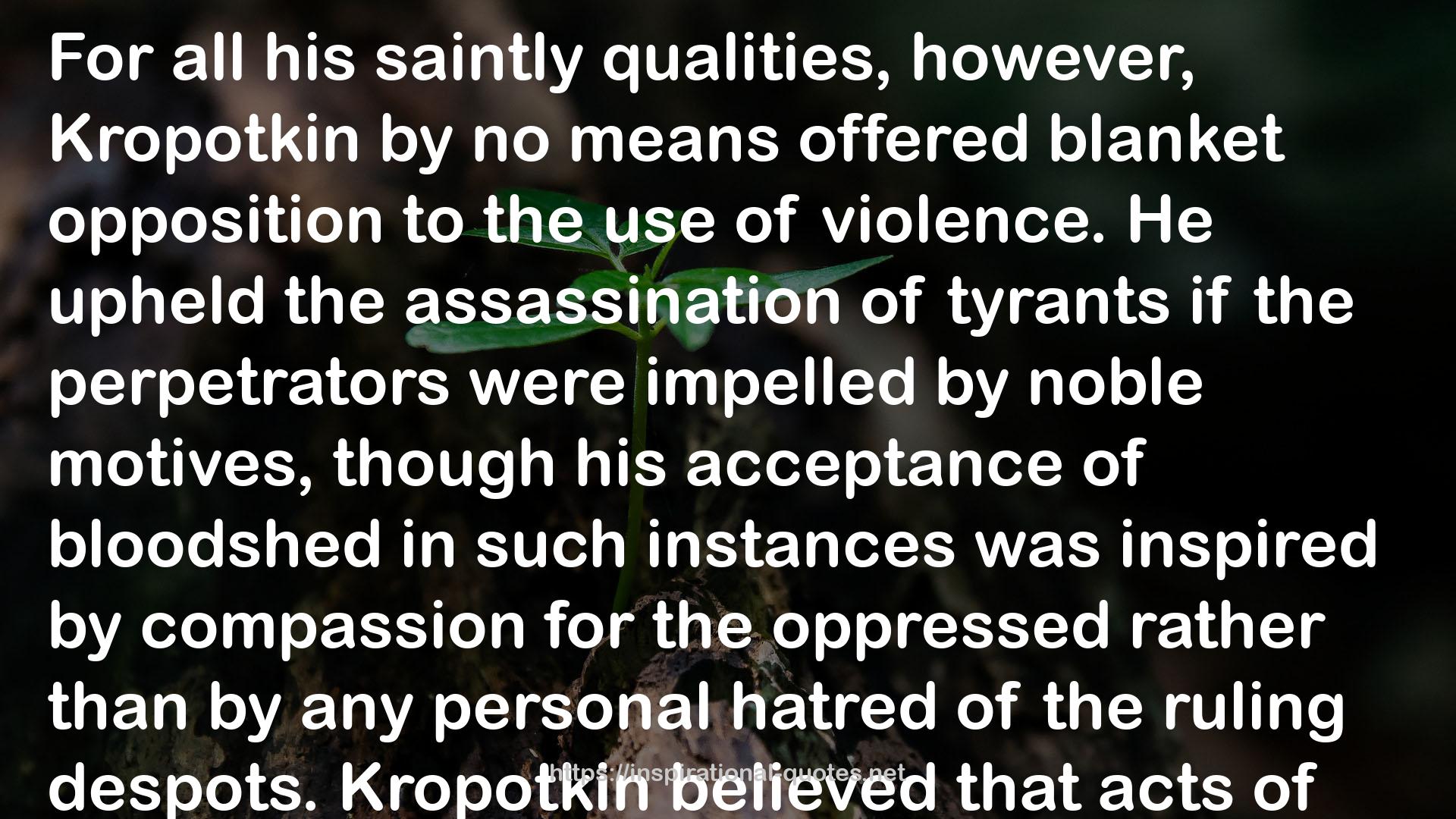" For all his saintly qualities, however, Kropotkin by no means offered blanket opposition to the use of violence. He upheld the assassination of tyrants if the perpetrators were impelled by noble motives, though his acceptance of bloodshed in such instances was inspired by compassion for the oppressed rather than by any personal hatred of the ruling despots. Kropotkin believed that acts of terror were among the very few means of resistance available to the enchained masses; they were useful as "propaganda by the deed," calculated to supplement oral and written propaganda in awakening the rebellious instincts of the people. Nor did Kropotkin shrink from revolution itself, for he hardly expected the propertied classes to give up their privileges and possessions without a fight. Like Bakunin, he anticipated an upheaval that would demolish capitalism and the state for all time. Nevertheless, he earnestly hoped that the rebellion would be a tame one, with "the smallest number of victims, and a minimum of embitterment." Kropotkin's revolution was to be speedy and humane—quite unlike Bakunin's demonic visions of fire and brimstone. "
― Paul Avrich , The Russian Anarchists
Image for Quotes

Kropotkin by no means offered blanket opposition to the use of violence. He upheld the assassination of tyrants if the perpetrators were impelled by noble motives, though his acceptance of bloodshed in such instances was inspired by compassion for the oppressed rather than by any personal hatred of the ruling despots. Kropotkin believed that acts of terror were among the very few means of resistance available to the enchained masses; they were useful as "propaganda by the deed," calculated to supplement oral and written propaganda in awakening the rebellious instincts of the people. Nor did Kropotkin shrink from revolution itself, for he hardly expected the propertied classes to give up their privileges and possessions without a fight. Like
Bakunin, he anticipated an upheaval that would demolish capitalism and the state for all time. Nevertheless, he earnestly hoped that the rebellion would be a tame one, with "the smallest number of victims, and a minimum of embitterment." Kropotkin's revolution was to be speedy and humane—quite unlike Bakunin's demonic visions of fire and brimstone." style="width:100%;margin:20px 0;"/>
 Kropotkin by no means offered blanket opposition to the use of violence. He upheld the assassination of tyrants if the perpetrators were impelled by noble motives, though his acceptance of bloodshed in such instances was inspired by compassion for the oppressed rather than by any personal hatred of the ruling despots. Kropotkin believed that acts of terror were among the very few means of resistance available to the enchained masses; they were useful as "propaganda by the deed," calculated to supplement oral and written propaganda in awakening the rebellious instincts of the people. Nor did Kropotkin shrink from revolution itself, for he hardly expected the propertied classes to give up their privileges and possessions without a fight. Like Bakunin, he anticipated an upheaval that would demolish capitalism and the state for all time. Nevertheless, he earnestly hoped that the rebellion would be a tame one, with "the smallest number of victims, and a minimum of embitterment." Kropotkin's revolution was to be speedy and humane—quite unlike Bakunin's demonic visions of fire and brimstone." style="width:100%;margin:20px 0;"/>
Kropotkin by no means offered blanket opposition to the use of violence. He upheld the assassination of tyrants if the perpetrators were impelled by noble motives, though his acceptance of bloodshed in such instances was inspired by compassion for the oppressed rather than by any personal hatred of the ruling despots. Kropotkin believed that acts of terror were among the very few means of resistance available to the enchained masses; they were useful as "propaganda by the deed," calculated to supplement oral and written propaganda in awakening the rebellious instincts of the people. Nor did Kropotkin shrink from revolution itself, for he hardly expected the propertied classes to give up their privileges and possessions without a fight. Like Bakunin, he anticipated an upheaval that would demolish capitalism and the state for all time. Nevertheless, he earnestly hoped that the rebellion would be a tame one, with "the smallest number of victims, and a minimum of embitterment." Kropotkin's revolution was to be speedy and humane—quite unlike Bakunin's demonic visions of fire and brimstone." style="width:100%;margin:20px 0;"/>